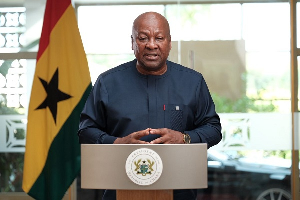Former President John Dramani Mahama has consistently expressed his intention to introduce a 24-hour economy in the country if he wins the 2024 elections. Industry players and other interest groups have expressed optimism about the proposal.
The Trade Union Congress (TUC) of Ghana has stated that the policy will be a game changer. However, the governing New Patriotic Party (NPP) has also consistently tried to downplay the importance of the proposed 24-hour economy.
In this article, I seek to draw on the success of the policy in other jurisdictions, zone it into Ghana, and analyse how it will benefit the Ghanaian economy.
Independent expert analysis estimates that London’s nighttime-called 24-hour economy contributed between £17.7 billion and £26.3 billion in Gross Value Added (GVA) to the UK economy in 2014. This figure is between five and eight percent of London’s entire Gross Domestic Product (GDP), estimated at £325 billion. Just as the 24-hour economy is important to London, London’s move to a 24-hour economy is vital to the wider economic development of the city.
Overall, the UK’s 24-hour economy is estimated to be £66 billion, with London representing up to 40% of this figure. The above figures indicate that the 24-hour economy plays a significant role in the socioeconomic development of the London area.
Moreover, in the employment sector, 24-hour economic activity directly contributes to the creation of 723,000 jobs; this represents one in eight jobs in the capital. A large number of these are in the manufacturing, bars, restaurants, clubs, shows, and hotels central to London’s nightlife and tourism.
Over a quarter (25.9%) of London’s accommodation and food services sector and more than one in five (22.4%) in arts, entertainment, and recreation usually work at night. In both cases, this is an even higher proportion than in the same sectors outside London (20.2% and 15.2%, respectively).
If, as the data suggests, one in eight (723,000 people in London alone) gained
employment through the 24-hour economy, the decision by former President Mahama to introduce and explore this avenue to address the unemployment problem in this country deserves recommendation. In London, the sector with the largest number of people who work nights is transport and storage, with around 107,000 total; this is followed by the health and social work industries, with slightly more than 101,000. Accommodation and food services come in third, with about 97,000 jobs created.
Experts have asserted that London’s 24-hour economy has a broad and deep
impact, hosting a range of high-skilled and high-GVAdefense sectors, including
professional, scientific and technical services, public administration; defence
and education.
In view of the above facts, it is important to put our political differences aside and encourage the implementation of this policy in the interest of mother
Ghana. The flagbearer of the National Democratic Congress's (NDC) intention to
The introduction of a 24-hour economy is laudable and must therefore be taken seriously.
Opinions of Friday, 23 August 2024
Columnist: Awudu Razak Jehoney















